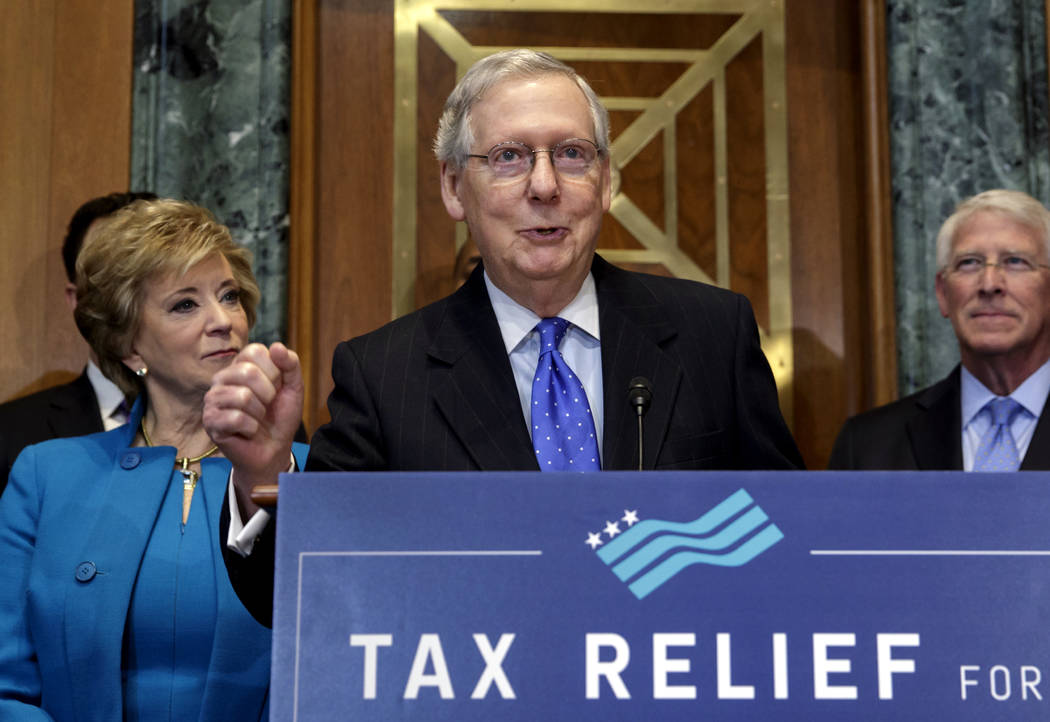Senate moves closer to vote on sweeping tax-reform bill
WASHINGTON — The Senate edged closer Thursday to a historic vote on a sweeping rewrite of the nation’s tax code that includes cuts for corporations, businesses and individuals but would heap $1.4 trillion onto the national debt over 10 years.
“This is a once-in-a-generation opportunity,” said Senate Majority Leader Mitch McConnell, R-Ky., “This is a good bill.”
But Republican leaders continued to work on galvanizing support for the bill among their caucus, tweaking the legislation to address the debt if economic growth projections failed to materialize and to help pay for massive permanent cuts to corporations. A vote could come on Friday.
Several deficit hawks in the GOP such as Sen. Bob Corker, R-Tenn., Sen. Jeff Flake, R-Ariz., and Sen. James Lankford, R-Okla., voiced concern about the debt. They want a “trigger” mechanism that would impose automatic tax increases to provide revenue if growth fails to materialize.
The Joint Committee on Taxation said the bill would cost $1.4 trillion and raise only $458 billion in offsetting revenue, figures that have bothered GOP lawmakers concerned with the debt. It would boost economic growth by just 0.8 percent over the next decade.
Nonetheless, the bill received a boost Thursday when Sen. John McCain, a recalcitrant Republican from Arizona, signaled he would support the legislation despite concerns.
“This is not a perfect bill, but it is one that would deliver much-needed reform to our tax code, grow the economy, and help Americans keep more of their hard-earned money,” McCain said in a statement.
Under the bill, the corporate tax rate would be cut from 35 percent to 20 percent. While the corporate cuts would be permanent, tax cuts for individuals would sunset in 2025 and taxes on some middle-class brackets would increase, according to the Joint Committee on Taxation.
The Senate bill would double the standard deduction, and Sen. Dean Heller, R-Nev., was instrumental in adding a provision to double the child tax credit to $2,000.
“This legislation will literally put thousands of dollars back into the pockets of hardworking Nevadans, allowing them to purchase anything from three months’ worth of groceries to 9,000 diapers,” Heller said.
Democrats are united in their opposition to the legislation. Sen. Catherine Cortez Masto, D-Nev., called the GOP plan “smoke and mirrors.”
“While the GOP claims it will help hardworking middle-class families, the fact is they will see their taxes go up over a decade,” Cortez Masto said in a statement on social media.
She said eventual taxes on middle-class families would go to oil companies, banks and the top 1 percent of wealthy individuals.
Senate Republicans are using special budget reconciliation rules to pass the tax bill with a simple majority and avoid a filibuster by Democrats.
Senate Minority Leader Charles Schumer, D-N.Y., said the way the GOP bill is being “rammed” through the Senate is the reason the American people think the process is broken.
“The Republican tax bill has made a mockery of the Democratic process,” Schumer said.
Despite obstacles the bill still faced late Thursday, expectations that the tax-cut package would pass had stocks soaring, with the Dow Jones industrial average closing above 24,000 for the first time.
Corporations and even small businesses, represented by the National Federation of Independent Businesses, which won a concession to give a mom and pop shops a bigger tax cut, have embraced the bill.
AARP, the retired persons lobby, is opposed the Senate bill, charging that cuts and rising debt will force Congress to cut Social Security, Medicare and Medicaid to offset the loss of tax revenue.
Realtors and homebuilders also oppose the bill.
Those groups said provisions that would prevent federal filers from deducting state and local taxes, and eventual tax hikes on middle-class families if the sunset cuts are not extended would cause property values to drop by 10 percent and eliminate an incentive for homebuyers.
President Donald Trump has stumped in Missouri and met with Republicans on Capitol Hill this week to bolster support for the legislation.
White House spokesman Sarah Sanders said Thursday that progress was being made on the package.
“We think we’re going to get it done by the end of the year,” she said.
The House passed its version of the bill on Nov. 16, which has major differences from the Senate version.
The Senate bill would eliminate the individual mandate in the Affordable Care Act, which requires federal filers to buy insurance or pay an IRS penalty.
Eliminating the mandate would defund the ACA system that provides federal subsidies for low-income families to purchase insurance.
The Congressional Budget Office estimates that eliminating the mandate would result in 4 million fewer people with insurance in 2019 and 13 million fewer people insured by 2027.
The House bill does not include that ACA mandate repeal but would eliminate deductions for families on medical expenses and college loan interest.
Differences in the two pieces of legislation would have to be reconciled in a House-Senate conference committee.
Contact Gary Martin at gmartin@reviewjournal.com or 202-662-7390. Follow @garymartindc on Twitter.

















